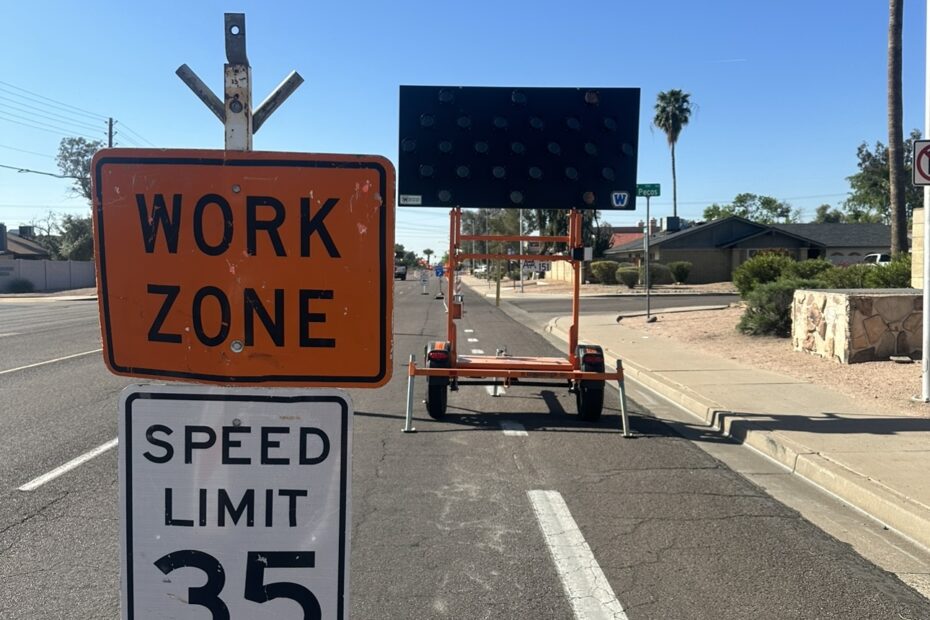National Work Zone Awareness Week (NWZAW) is an annual event held in the United States to bring attention to the importance of work zone safety. This event aims to raise awareness about work zones and the dangers they present to workers and drivers. In this blog post, we will discuss why work zone safety is so important, what can be done to improve safety, and how you can get involved in this important cause.
Work zones are set up according to the type of road, the work to be done, and may be short-term or long-term. Work zones create a combination of hazards that can result in crashes, injuries, and fatalities; and have become increasingly dangerous places for both drivers and workers. According to the Bureau of Labor Statistics, an average of 120 workers die each year at road construction sites.
It is essential to prioritize safety measures in work zones to ensure everyone involved in the project remains safe. The following are some essential tips to ensure work zone safety:
- Identify Hazards – Identifying hazards is the first step towards ensuring work zone safety. The project manager should conduct a thorough risk assessment of the work zone to identify potential hazards. This may include things such as heavy equipment, uneven terrain, construction materials, and even wildlife. Once these hazards are identified, steps should be taken to mitigate the risks associated with them.
- Mark The Work Zone – The next step is to mark the work zone to make it visible to motorists and pedestrians. This can be done by using barricades, cones, and signage. The markings should be bright, visible, and easy to understand. This will help to minimize confusion and reduce the likelihood of accidents.
- Provide Training – All workers should receive appropriate training before entering the work zone. This includes training on the use of Personal Protective Equipment (PPE), proper handling of equipment, and emergency procedures. Workers should also be trained on how to identify hazards and how to report them to their supervisor.
- Use Appropriate PPE – Personal Protective Equipment (PPE) is essential to ensure worker safety in a work zone. Workers should be provided with appropriate PPE, including hard hats, safety glasses, gloves, and high-visibility clothing. The PPE should be properly maintained, and workers should be trained on how to use and care for it.
- Control Traffic Flow – Controlling traffic flow is essential to ensure work zone safety. This can be done by using traffic cones, barriers, and flaggers. Flaggers are responsible for directing traffic through the work zone and ensuring motorists and pedestrians obey the posted signs and signals.
- Properly Maintain Equipment – Proper equipment maintenance is essential to ensure worker safety. All equipment should be inspected regularly to ensure it is in good working order. Any equipment that is found to be faulty or unsafe should be taken out of service until it can be repaired.
- Communicate Effectively – Finally, communication is essential in a work zone to ensure everyone is aware of what is happening. The project manager should ensure everyone involved in the project is aware of the hazards and the safety procedures that are in place. Workers should also be encouraged to report any hazards or unsafe conditions to their supervisor.
So, what can you do to help promote work zone safety during National Work Zone Awareness Week? The following are a few ideas:
- Slow down and pay attention. When you see a work zone, slow down and be prepared to stop if necessary. Pay attention to the signs and signals and follow the directions of any workers or law enforcement officers in the area.
- Plan ahead. If you know you’ll be driving through a work zone, plan your route ahead of time so you can avoid delays or congestion. This can also help you stay focused on the road and avoid distractions.
- Be patient. Work zones can be frustrating but remember that the workers are doing important work to keep our roads safe and functional. Be patient and wait for them to finish their work before proceeding.
- Spread the word. Share information about National Work Zone Awareness Week on social media and encourage your friends and family to slow down and pay attention when driving through work zones.
In conclusion, work zone safety is essential to ensure everyone involved in a construction or road work project remains safe. By identifying hazards, marking the work zone, providing appropriate training, using appropriate PPE, controlling traffic flow, properly maintaining equipment, and communicating effectively, the risks associated with a work zone can be minimized. It is the responsibility of the project manager to ensure that these safety measures are in place and that they are followed by everyone involved in the project. By working together to promote work zone safety, we can help prevent accidents and save lives. Let’s all do our part to keep our roads safe for everyone.
